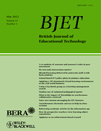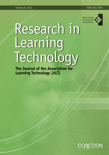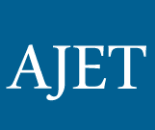
Technology Knowledge and Learning
Scope & Guideline
Innovating Knowledge Transfer through Technology
Introduction
Aims and Scopes
- Technology Integration in Education:
The journal focuses on how various technologies can be utilized to enhance teaching and learning processes across different educational settings, including K-12 and higher education. - Learning Analytics and Data-Driven Decision Making:
A significant emphasis is placed on learning analytics, exploring how data can inform educational practices and improve learning outcomes through insights derived from student performance. - Self-Regulated Learning and Student Engagement:
Research in this area investigates strategies for promoting self-regulated learning and enhancing student engagement, particularly in technology-supported environments. - Innovative Pedagogical Approaches:
The journal encourages studies that explore new pedagogical models and frameworks, such as flipped classrooms, gamification, and blended learning, that leverage technology to foster active learning. - Digital Competencies and Teacher Training:
An important focus is on assessing and developing the digital competencies of both educators and students, including the training necessary for effective technology integration in teaching. - Impact of Emerging Technologies:
The journal examines the implications of emerging technologies, such as artificial intelligence, virtual reality, and gamification, on educational practices and learning experiences.
Trending and Emerging
- Artificial Intelligence in Education:
Research on the applications and implications of artificial intelligence in educational settings is rapidly increasing, focusing on how AI can support personalized learning and assessment. - Gamification and Game-Based Learning:
There is a growing trend towards exploring gamification and game-based learning strategies, emphasizing their effectiveness in enhancing student motivation and engagement. - Blended and Hybrid Learning Models:
Studies exploring blended and hybrid learning models are on the rise, particularly in light of recent shifts towards more flexible learning environments due to global events. - Social-Emotional Learning in Digital Contexts:
Emerging research is increasingly addressing the importance of social and emotional learning within digital ecosystems, recognizing the need for holistic educational approaches. - Equity and Access in Digital Learning:
There is a heightened focus on issues of equity and access in education, particularly concerning marginalized populations and the digital divide exacerbated by the pandemic. - Virtual and Augmented Reality in Education:
Research on the use of virtual and augmented reality technologies is becoming more prevalent, exploring their potential for immersive learning experiences and skills training.
Declining or Waning
- Traditional Educational Methods:
There is a noticeable decline in research focused solely on traditional teaching methods, as the emphasis shifts towards innovative and technology-enhanced approaches. - General Educational Technology Use:
Papers that discuss generic technology use without specific educational frameworks or pedagogical strategies are becoming less common, as the journal seeks more targeted studies. - Assessment of Standardized Testing:
Research centered on standardized testing and assessment methods is waning, with a growing focus on formative and alternative assessments that better align with technology-enhanced learning. - Passive Learning Strategies:
There is a noticeable decrease in studies advocating for passive learning strategies, such as lecture-based instruction, as the journal prioritizes active learning methodologies. - Static Learning Environments:
Interest in static learning environments that do not leverage technology for interaction or engagement is diminishing, as dynamic and interactive learning spaces gain traction.
Similar Journals

Journal of Information Technology Education-Innovations in Practice
Unlocking New Possibilities in Teaching and LearningThe Journal of Information Technology Education-Innovations in Practice (ISSN: 2165-3151; E-ISSN: 2165-316X), published by the Informing Science Institute, serves as a vital resource for researchers and practitioners in the intersection of information technology and education. With a focus on innovative practices and pedagogical advancements, this journal aims to disseminate high-quality research that enhances teaching methodologies and learning experiences in the digital age. Having demonstrated its relevance within the academic community, it proudly holds a Q3 category ranking in both Computer Science and Education fields as of 2023, alongside commendable Scopus rankings, namely #812 out of 1543 in Social Sciences Education and #92 out of 133 in Computer Science (miscellaneous). As a platform that actively promotes open access knowledge, the journal encourages boundary-pushing inquiries while catering to the evolving needs of educators and technology specialists alike. With its convergence period spanning from 2015 to 2024, the journal is poised to play a significant role in shaping the future of IT education.

Research and Practice in Technology Enhanced Learning
Elevating educational experiences through rigorous research.Research and Practice in Technology Enhanced Learning is a leading international journal dedicated to advancing the field of educational technology and its applications in various learning environments. Published in Taiwan, this journal has firmly established itself as an open-access platform for sharing innovative research, practical insights, and emerging trends since its inception in 2015. With an impressive Q1 ranking in Education and Media Technology for 2023, coupled with notable placements in the fields of Social Psychology and Management of Technology and Innovation, the journal underscores its significance in fostering interdisciplinary collaboration among scholars and practitioners. Its rigorous peer-review process ensures the publication of high-quality articles that contribute substantively to both theoretical and practical knowledge. The journal's commitment to open access enhances its visibility and accessibility, making it an invaluable resource for researchers, educators, and students seeking to explore the intersection of technology and learning.

BRITISH JOURNAL OF EDUCATIONAL TECHNOLOGY
Championing Evidence-Based Practices in Education TechnologyBRITISH JOURNAL OF EDUCATIONAL TECHNOLOGY, published by Wiley, is a leading journal in the field of educational technology, recognized for its commitment to advancing research and practice in this dynamic arena. With an impressive impact factor that places it in the Q1 quartile for both Education and E-learning in 2023, it serves as a critical resource for academics, practitioners, and policymakers alike. This journal, with an established publication history since 1970, focuses on the integration of technology in educational settings, aiming to disseminate innovative findings and facilitate discussions that enhance learning experiences. Researchers contributing to the journal address diverse topics from digital learning environments to the pedagogical implications of emerging technologies, ensuring comprehensive coverage of the latest trends and methodologies. Submissions are welcomed in various formats, promoting collaborative scholarly dialogue in fostering effective educational practices. Access to the journal is available through traditional subscription frameworks, ensuring broad accessibility for institutions and individuals invested in the advancement of educational technology.

Research in Learning Technology
Advancing Knowledge and Practice in Learning TechnologiesResearch in Learning Technology, published by the Association for Learning Technology (ALT)impact factor, the journal has consistently ranked in the top quartiles of both the Education (Q1) and Computer Science Applications (Q2) categories as of 2023, highlighting its significance and influence in the academic community. The journal is committed to disseminating high-quality research and practical insights that bridge the gap between technology and pedagogy, making it an essential resource for researchers, educators, and practitioners alike. The Scopus rankings further emphasize its reputation, placing it in the top 10% of social sciences education journals. As an open-access journal, Research in Learning Technology ensures that its valuable content is freely accessible, empowering a global audience to drive innovation in learning technology. Whether you are a seasoned researcher or a student exploring this dynamic field, this journal serves as a vital platform for sharing knowledge and advancing the discourse in learning technologies.

Australasian Journal of Educational Technology
Advancing the Future of Learning Through TechnologyAustralasian Journal of Educational Technology (AJET), a premier peer-reviewed journal published by the Australasian Society for Computers in Learning in Tertiary Education (ASCILITE), has been at the forefront of advancements in educational technology since its inception in 1985. With an impressive Q1 ranking in both Education and E-learning categories for 2023, this open access journal (ISSN: 1449-3098, E-ISSN: 1449-5554) serves as a vital platform for researchers, practitioners, and students aiming to disseminate innovative research and practices in the use of technology for teaching and learning in tertiary education. Based in Australia and accessible to a global audience, AJET is committed to enhancing educational outcomes through the integration of technology, fostering a vibrant community of scholarship and collaboration among educators and industry professionals. With its high impact ranking (Rank #105/1543 in Social Sciences - Education), AJET remains a significant contributor to the scholarly discussion on effective learning environments in an increasingly digital world.

Contemporary Educational Technology
Exploring the Future of Education and TechnologyContemporary Educational Technology is a premier journal published by BASTAS PUBL LTD - UK, specializing in the dynamic intersection of educational practices and technological advancements. With an E-ISSN of 1309-517X, this journal serves as a vital resource for researchers, educators, and professionals keen to explore innovative solutions and methodologies in education. Ranked in the Q2 category for both Education and Management of Technology and Innovation in 2023, Contemporary Educational Technology boasts impressive Scopus ranks, standing at #187 out of 1543 in the Social Sciences Education field, reflecting its influence and contribution to contemporary research. Through its open-access approach, this journal facilitates the dissemination of knowledge, making cutting-edge research readily available to a global audience. By examining developments from 2018 through 2024, it aims to critically analyze and promote the integration of technology in educational contexts, thereby fostering improved learning outcomes and innovative teaching practices.

International Journal of Education and Information Technologies
Fostering Research that Transforms Learning EnvironmentsWelcome to the International Journal of Education and Information Technologies, a leading academic platform published by NORTH ATLANTIC UNIV UNION-NAUN. With an emphasis on the integration of education and information technology, this journal aims to foster innovative research and discussions that enhance pedagogical practices and technological advancements in educational contexts. Although currently an open access journal, it provides unrestricted access to emerging studies that are crucial for educators, researchers, and professionals aiming to stay at the forefront of education technology. While specific metrics such as H-index and Scopus ranks are yet to be defined, its ISSN 2074-1316 signifies its credibility and commitment to quality scholarship. This journal serves as a vital resource for those passionate about bridging the gap between technology and education, encouraging impactful research that shapes the future of learning environments.

Education and Information Technologies
Navigating the evolving landscape of education and tech.Education and Information Technologies, published by SPRINGER, is a leading journal dedicated to the intersection of educational practices and innovative information technologies. With an impressive impact factor and consistently ranked in the Q1 quartile across Education, E-learning, and Library and Information Sciences, this journal serves as an essential resource for researchers and professionals aiming to explore the dynamic landscape of educational technology. Spanning from 1996 to 2024, it provides a platform for high-quality, peer-reviewed articles that contribute to the evolving discourse in this critical field. The journal’s rigorous Scopus ranking, placing it in the top 4% of Social Sciences Education and top 6% in Library and Information Sciences, highlights its significance in advancing scholarly knowledge. While it offers various access options, the focus remains on delivering cutting-edge research that can inform teaching practices and technological integration in education, making it indispensable for students, educators, and technology developers alike.

EDUCATIONAL TECHNOLOGY & SOCIETY
Empowering Educators with Cutting-Edge InsightsEDUCATIONAL TECHNOLOGY & SOCIETY is a prestigious, peer-reviewed journal dedicated to advancing the fields of educational technology and its societal implications. Published by the International Forum on Educational Technology and Society at National Taiwan Normal University, this journal has established itself as a transformative platform for research and innovation in education, e-learning, and engineering. With a commendable impact factor reflected in its Q1 quartile rankings across multiple categories, including Education and Sociology, this journal is recognized for its rigorous scholarship and impactful contributions, ranking in the top percentiles within its respective fields. Since its transition to Open Access in 1998, EDUCATIONAL TECHNOLOGY & SOCIETY has provided an invaluable resource for researchers, educators, and policymakers, facilitating the dissemination of cutting-edge research that drives progress in educational practices globally. Whether you are a seasoned researcher or a dedicated student, this journal fosters a vibrant academic community committed to exploring innovative approaches in educational technology.

Journal of E-Learning and Knowledge Society
Bridging Theory and Practice in E-Learning ExcellenceJournal of E-Learning and Knowledge Society is a premier academic journal dedicated to the exploration and advancement of e-learning and knowledge dissemination in contemporary society. Published by the SOC ITALIANA E-LEARNING, this journal has established itself as a vital resource for researchers and practitioners since its inception in 2006. With an open access model adopted in 2007, the journal promotes the free exchange of ideas and research findings, ensuring wide accessibility to academic contributions in this rapidly evolving field. The journal is indexed in notable databases and holds a Q3 classification in both Computer Science Applications and Education, reflecting its significant role in the advancement of educational technologies. Furthermore, its Scopus ranks highlight its relevance within the educational and computer science communities. Based in Rome, Italy, the Journal of E-Learning and Knowledge Society aims to bridge the gap between theory and practice, providing a platform for innovative research that shapes the future of digital learning environments. Whether you are a researcher, educator, or student, this journal offers valuable insights and developments in e-learning that are critical to navigating today’s knowledge society.